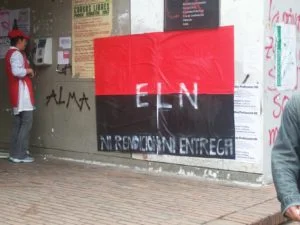Despite Ceasefire, ELN Blamed for Assassination
Aulio Isamara Forastero, a Colombian indigenous activist, was killed on October 24. Many have blamed the National Liberation Army (ELN), which signed a ceasefire with the government on October 1, for the murder.
Forastero was taken from his home by five armed men. Two hours after the kidnapping, nearby residents heard gunshots. Witnesses have accused the ELN of the crime, as the kidnappers wore uniforms similar to those associated with the guerilla group.
The government is leading a formal investigation into the rebel group and its possible relation to the murder. Colombian President Juan Manuel Santos addressed the investigation, saying, “So far there is a specific complaint against the ELN and if that is proven, it would clearly have been a violation of the ceasefire.”
According to indigenous leaders of Alto Baudó, a municipality in Chocó province where Forastero focused his activism, this is not the first instance of ELN operations since the ceasefire. In a statement to El Colombiano, one leader said, “They are planting anti-personnel mines, not for confinement, they are recruiting and there is an armed presence in our ancestral territories. There are no measures that guarantee the real and effective protection of the communities.”
The assassination of indigenous and social leaders in Colombia have long been widespread, and the United Nations, as well as organizations such as the Washington Office on Latin America (WOLA) and Amnesty International, have expressed concern about the future of the peace process. President Santos has made a connection between the the deaths of Forestero and others with the operations of rebel groups. Many of those murdered promoted the substitution of illegal crops such as coca.
The Americas Director of Amnesty International, Erika Guevara Ross, expressed concern about the situation and its potential consequences on Colombia, saying that the murders of the various social leaders like Aulio Isamara Forastero “will leave an indelible stain on any resulting peace accord.”

